SPECIAL REPORT : Part 387
By Shamindra Ferdinando
UN Resident Coordinator in Colombo Hanna Singer-Hamdy paid a courtesy call on Defence Secretary (retd.) Gen. Kamal Gunaratne on Sept. 23 at the Defence Headquarters Complex, Sri Jayewardenepura, Kotte. The Egyptian was accompanied by the head of the United Nations Office on Drugs and Crime (UNODC) Alan Cole, formerly of the British Royal Navy.
The discussion covered Sri Lanka’s high profile ongoing campaign against narcotics trade and the government’s response to the raging Covid-19 epidemic.
A brief press release issued by Lt. Col. Nalin Herath, Officiating Director, Army Media Centre, in Sinhala, Tamil and English didn’t make reference to any other issue. Therefore, the writer rationally ascertained that no other matter had been taken up at the discussion.
Against the backdrop of the 48th session of the Geneva-based United Nations Human Rights Council (UNHRC) and the 76th session of the UNGA in New York, the Sri Lanka Podujana Peramuna (SLPP) government could have used the Sept. 23 meet to brief the UN Resident Coordinator Singer as regards the accountability process.
The Defence Secretary, on behalf of the government, could have handed over a comprehensive report to the top UN official in Sri Lanka, in response to one-sided and high-handed the war crimes agenda pursued by the UNHRC against the country. Unfortunately, the government didn’t. The failure on the part of the government to do so underscored the absence of a cohesive mechanism to counter the campaign targeting Sri Lanka. Shoddy handling of the accountability process is an affront to the war-winning military that sacrificed so much to fight and defeat, militarily, ‘the world’s worst terrorist outfit’. More than 12 years after the eradication of the Liberation Tigers of Tamil Eelam (LTTE), Sri Lanka remains under the UNHRC microscope, while many other countries, that caused death and misery to millions by launching false pretext wars or through illegal regime change actions are allowed to go scot-free.
For some strange reason, most probably for lack of competence at the Foreign Ministry, the government is reluctant to properly present Sri Lanka’s case before the international community. Let us hope that with Prof. G.L. Peiris, the eminent former law academic at the helm of the Foreign Ministry, we can mount a relentless diplomatic campaign to have the country cleared from such blatant accusations. In the process, it could even go to the extent of exposing, particularly our main accusers, who despite having plenty of innocent blood in their hands are pursuing this vendetta against us due to geo-political agendas.
The wartime General Officer Commanding (GoC) the elite 53 Division, the then Maj. Gen. Gunaratne could have meticulously briefed the UN Chief here, who, too, has had the audacity to make public comments on the country’s internal affairs and get away with such behaviour.
The author of ‘Road to Nanthikadal’, Gunaratne commanded one of the two fighting Divisions, the other being the 58 Division commanded by the present Army Commander, General Shavendra Silva, involved in the final phase of the offensive. It would be pertinent to mention that a battalion (4 Vijayabahu Infantry Regiment) that had been under the overall command of the then Maj. Gen. Gunaratne killed Prabhakaran. The 53 Division had been involved in the unprecedented Anandapuram battle (late March-early April 2009) along with 58 Division and Task Force 8 that dealt a massive blow to the LTTE.
Why didn’t the government exploit the Sept. 23 meet that took place the day after President Rajapaksa addressed the 76th session of the UNGA in New York?
Sri Lanka’s continuing failure to set the record straight should be examined taking into consideration UNHRC Chief Michelle Bachelet’s latest oral update on the situation in Sri Lanka (on Sept. 13), Foreign Minister Prof. G.L. Peiris’ response by Zoom to the former twice Chilean President Bachelet on the following day, President Rajapaksa’s meet with UNSG Antonio Guterres (on Sept. 19), President Rajapaksa’s address to the UNGA (Sept. 20) and three meetings Foreign Minister Prof. G.L. Peiris had with Commonwealth Secretary General Patricia Scotland, Australian Foreign Minister Marise Payne and Indian Foreign Minister Dr. S. Jaishankar also in New York.
The Defence Secretary is the ideal person to discuss the accountability issue. With Sri Lanka firmly on the UN agenda and the issue coming up for scrutiny once again at the 49th session in March 2022, the government cannot turn a blind eye to the developments taking place.
Vanni war compared with Ruwanda et al
Antonio Guterres’s predecessor, Ban Ki-moon once compared the Vanni offensive with that of Ruwanda and Serbia genocides in the 1990s. Gunaratne strongly disputed Ban Ki-moon’s comparison of Vanni offensive with clear cut cases of genocide in those two countries
South Korean Ki-moon played his part to facilitate the Western agenda in spite of his own mission in Colombo contradicting unsubstantiated accusations.
The government owed an explanation why absolutely no attempt was made in Geneva or New York to challenge the unsubstantiated war crimes allegations that paved the way for Western powers and other interested parties to place Sri Lanka on the Geneva agenda.
Instead of setting the record straight, President Rajapaksa assured his readiness to work with domestic stakeholders, international partners, UN, civil society and Tamil expatriate groups, whereas FM Peiris reiterated Sri Lanka’s commitment to some key provisions in the resolution co-sponsored by the then Yahapalana government in 2015 as fait accompli, while strongly rejecting external interventions.
In separate meetings with Aussie Foreign Minister Patricia, Scotland Marise Payne and Indian counterpart Dr. Jaishankar, Prof. Peiris explained ground realities and the hostile approach adopted by interested parties. Prof. Peiris also elucidated to Scotland the wrongness in replacing domestic accountability mechanisms with external bodies, particularly the ad-hoc mechanism approved at the 46th Geneva session.
Bachelet declared in her Sept. 13 speech that the UNHRC was going ahead with the investigation. Sri Lanka shouldn’t expect Scotland to take a stand favourable to Sri Lanka, under any circumstances, as the organisation Bachelet leads conveniently turned a Nelsonian eye to Indian sponsored terrorism that ravaged Sri Lanka. Did Commonwealth ever take a stand on the destabilisation of the smaller neighbour by the Commonwealth giant?
Prof. G.L. Peiris told his Australian counterpart Marise Payne how Bachelet followed a policy extremely detrimental to Sri Lanka as regards the accountability process. A Foreign Ministry press release quoted Prof. Peiris as having told Payne: “….there is a need to allow local institutions the space and opportunity to carry out their mandates and the establishment of an ad-hoc external mechanism that overrides this work is unnecessary and detrimental. It is premature and inappropriate to have a mechanism selectively targeting Sri Lanka that goes against the very principles of the UN Charter.”
Australia is aware of the Geneva project meant to undermine Sri Lanka. Regardless of close bilateral relations between Australia and Sri Lanka, the former will abide by the US position vis-a-vis Sri Lanka. The Australian policy should be examined, keeping in mind its role in the US-led alliances against China and extremely close relationship between Sri Lanka and China, the emerging world power.
The surprise Australia, the UK and the US (AUKUS) alliance struck recently, at the expense of France, on supplying a nuclear powered submarine fleet to their colonial cousin Australia should be an example of the old adage that blood is thicker than water.
The new three nation Anglo-Saxon alliance suddenly arrayed against China should also serve as a warning to New Delhi that it is already an odd partner, though one of the earliest to sign up for Quad, comprising the US, Japan, India and Australia ranged against China. If they could ditch long standing European ally France without batting an eye lid, Delhi can imagine how they will treat her if they suddenly see India too as a rival like China.
French Foreign Minister Jan-Yves Le Drian went to the extent of alleging US President Joe Biden of stabbing France in the back.
“It’s really a stab in the back. We had established a relationship of trust with Australia, this trust has been betrayed”, Foreign Minister Jean-Yves Le Drian told France Info radio. “I’m very angry today, and bitter… this is not something allies do to each other”, he said, noting that Australia would now have to explain how it would exit the contract.
A lesson for France
So Sri Lanka should not depend on foreign powers, entirely. It would be Sri Lanka’s responsibility to present its case before the global community. Major Western powers will never take a stand in support of a smaller nation at the expense of their overall strategy and lucrative business interests, the only exception being the case of Israel. There cannot be a better example than Australia going back on an agreement with France for what it considered a much better arrangement for Canberra. Obviously, not only Biden but the British and Australian leaders, too, stabbed France in the back.
In his talks with Dr. Jaishankar, Prof. Peiris declared Sri Lanka couldn’t accept external mechanisms active on the ground whereas the Indian Minister underscored the need for a fair and just resolution of residual issues in the interest of both countries.
Sri Lanka seems trapped in the eneva machinations. India, too, should be wary as its much touted relationship with the US does not mean a thing if one examined the way the US, the British and Australians sprang quite a despicable surprise.
Hope the world hasn’t forgotten how the US discarded Pakistan after having used the country in its proxy war to oust the Soviet Union from Afghanistan and to intimidate India when it was seen as being in Soviet camp. New Delhi remained noncommittal regarding the Soviet invasion of Afghanistan.
In fact, Indian destabilisation of Sri Lanka, in the 80s, is in line with its overall strategy to counter domestic threats emanating from Tamil Nadu in the backdrop of perceived threat of Sri Lanka being a base for US-Israeli operations.
However, for want of cohesive policy Sri Lanka, at least after the end of the war hadn’t made a genuine effort to set the record straight.
Prof. Peiris during his interactions with foreign dignitaries, has quite clearly explained Sri Lanka’s refusal to accept external mechanisms. President Rajapaksa, too, stressed the importance of domestic mechanisms in achieving reconciliation. Both the President and the Foreign Minister declared Sri Lanka’s readiness to work with domestic stakeholders, including the civil society, Tamil expatriate groups, international partners and the UN to accomplish genuine peace.
Pompeo on Shavendra
However, the incumbent government has so far failed to question the very basis for domestic mechanisms set up by the previous government on the strength of unsubstantiated allegations. The government owed an urgent explanation. There cannot be any excuse for not presenting a proper defense on behalf of the war-winning armed forces. Commander of the Army Gen. Shavendra Silva remains blacklisted by the US on unsubstantiated allegations. Let me reproduce the former US Secretary of State Mike Pompeo declaration on Feb 14, 2020: “I am designating Shavendra Silva making him ineligible for entry into the U.S. due to his involvement in extrajudicial killings during Sri Lanka’s Civil War. The U.S. will not waver in its pursuit of accountability for those who commit war crimes and violate human rights.”
The US made the announcement after President Gotabaya Rajapaksa named Silva the Chief of Defence Staff (CDS). Another Gajaba Regiment veteran Chagie Gallage highlighted Sri Lanka’s pathetic failure to defend the military when he retired on August 31, 2018.
There had never been a previous instance of a senior officer in his farewell speech questioning the overall failure to counter the foreign project. This happened at Saliyapura, the famed Gajaba Regimental Headquarters.
He said: “Gajaba is engraved in golden letters in the annals of the Sri Lanka Army’s history, if not in the history of Sri Lanka … and I’m certain it will never be reversed by any. So, I’m happy to be retired being a tiny particle of that proud chapter of the history, though designated as a ‘War Criminal”.
About 10 months before Gallage’s retirement, Lord Naseby made a stunning revelation in the House of Lords. On the basis of hitherto confidential dispatches from the British High Commission in Colombo, during January-May 2009, the Conservative politician contradicted the very basis of the three-member Darusman report. This report, released on March 31, 2011, had been the primary reason for the 2015 accountability resolution that faulted the Sri Lanka Army.
The World War 11 fighter pilot fought a near three-year battle with the British administration to secure the confidential dispatches and was finally able to obtain a highly redacted version to contradict the lies in the second week of Oct 2017. Although the then Foreign Minister Tilak Marapana, PC, in his address to the UNHRC made a reference to Lord Naseby’s revelations, Sri Lanka has so far not requested Geneva to examine the British dispatches.
The author of British dispatches Lt. Col. Anthony Gash has never challenged the authenticity of heavily censored dispatches disclosed by Lord Naseby.
Sri Lanka earlier squandered a similar golden opportunity to make a strong case for a revisit of the Darusman report in June 2011. The then US Defence Advisor in Colombo Lt. Col. Lawrence Smith quite convincingly defended the Sri Lanka Army at the 2011 Colombo Defence Seminar. The American contradicted unsubstantiated allegations raised by a retired Indian Major General Ashok K. Metha, formerly of the IPKF. Lt. Col. Smith must have made that declaration, based on information available to the US Embassy in Colombo as well as other dispatches from our war zone. And most importantly, the American officer made the declaration within three months after the releasing of the Darusman report. Sri Lanka is yet to use British and American dispatches in her defence.
Western powers continue to harass Sri Lanka on the basis of unsubstantiated war crimes accusations. Bachelet’s move to further investigate Sri Lanka should be challenged as the previous accusations that led to the 2015 Geneva resolution remained uninvestigated.
According to the Darusman report (paragraph 23: Confidentiality of the Panel’s records), the accusations cannot be examined till 2031. This strange stipulation has a further clause stating that the time bar could be extended for a further period. We must be the only country not allowed to see our accusers or the case against us for so long! But, successive governments never took the entire gamut of issues into consideration before making representations on behalf of the country. The incumbent SLPP is no exception. In spite of repeated vows to defend the armed forces, the SLPP had pathetically failed in its duty and responsibility.
Predicament of former SLAF Chief
As a result of sheer negligence, Sri Lanka has ended up being categorised as a perpetrator of war crimes, and those who had fought for the country are targeted. There cannot be a better example than Air Marshal Sumangala Dias who suffered due to Sri Lanka’s failure. Canada refused to accept Dias as Sri Lanka’s High Commissioner though the former Sri Lanka Air Force Commander is not under human rights scrutiny. Subsequently, the government proposed Dias as Sri Lanka’s Ambassador to Italy. However, we are yet unaware of Italy’s position. Italy as a member state of the EU, pursuing war crimes accusations against Sri Lanka, may not accept the retired SLAF Chief.
Prominent civil society activist Harsha Kumara Navaratne has quit the Human Rights Commission to take over the country’s mission in Ottawa. The former head of the NGO Seva Lanka, with his experience with the HRC, hopefully would be able to improve Sri Lanka’s image in Canada. The decision to name former minister Mahinda Samarasinghe as Sri Lanka’s Ambassador in Washington, too, is an interesting development. Samarasinghe handled human rights and related matters during Mahinda Rajapaksa’s presidency and was part of Sri Lanka’s delegation to Geneva. Perhaps the government expects missions in Washington (non- career diplomat), Ottawa (non- career diplomat) and London manned by career diplomat Saroja Sirisena to improve the ground situation. New Delhi should be part of the operation. Milinda Moragoda, who had served Ranil Wickremesinghe’s government as a Cabinet minister before switching allegiance to Mahinda Rajapaksa, recently took over the New Delhi mission. So, we now have two former ministers as heads of missions in New Delhi and Washington and prominent civil society activist in Ottawa.
Samarasinghe last served as the Ports and Shipping Minister. Having succeeded Arjuna Ranatunga (UNP), Samarasinghe, who represented the SLFP at that time, signed the 99-year-lease on the Hambantota port. Navaratne quit Seva Lanka chairmanship last month having disengaged from the NGO’s activity, beginning January this year. Navaratne’s appointment is in line with the government entering into a dialogue with the local civil society as well as President Gotabaya Rakapaksa’s declaration in New York his readiness to talk with Tamil expatriate groups. Whatever, the SLPP government does, it should set up a mechanism, without further delay, to counter those propagating lies in support of the Geneva project.
A role for ex-CNI
Perhaps former Chief of National Intelligence (CNI), Maj. Gen. Kapila Hendavitharana can be engaged to work out a proper strategy. Intelligence veteran Hendavitharana can be part of a special team assigned to build a strong case on behalf of the country on the basis of available information.
The information unintentionally made available by those pursuing war crimes probe can be quite useful to Sri Lanka as they are astonishing. Let there be a meticulous study of statements, accusations, documents and reports pertaining to accountability issues. Bachelet rushing to accuse the Sri Lanka Army of being responsible for so-called mass graves in Mannar, discovered in 2019, exposed the irresponsible conduct of the Geneva body, when a reputed US lab determined that those remains belonged to the colonial era.
Bachelet obviously acted on information provided by some Colombo-based diplomatic missions. There is no doubt that the British HC and the German Embassy in Colombo (both members of the self-appointed Sri Lanka Core Group in Geneva) influenced Bachel’s decision.
Due to petty political backbiting, Sri Lanka then lacked the political will to expose the Geneva project. As the simmering controversy over Mannar mass graves erupted during the yahapalana administration, the Foreign Ministry conveniently remained silent. That was nothing but treacherous behaviour and the Ministry, as one of the most important institutions, should be ashamed.
Sri Lanka didn’t have the guts to use Bachelet’s irresponsible conduct to challenge the overall process. Had there been a proper review of facts, since the change of government in Nov 2019, Gen. Gunaratne could have exploited his meeting with Hanaa Singer-Hamdy.

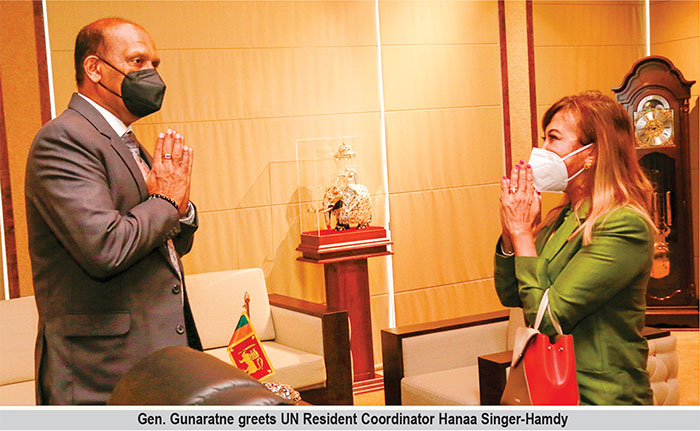
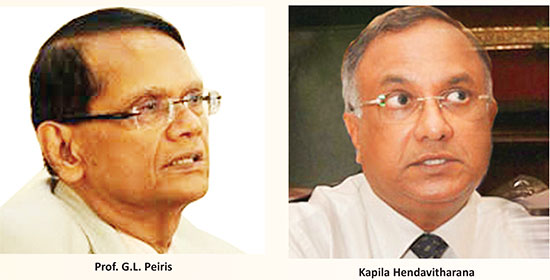 Antonio Guterres’s predecessor, Ban Ki-moon once compared the Vanni offensive with that of Ruwanda and Serbia genocides in the 1990s. Gunaratne strongly disputed Ban Ki-moon’s comparison of Vanni offensive with clear cut cases of genocide in those two countries
Antonio Guterres’s predecessor, Ban Ki-moon once compared the Vanni offensive with that of Ruwanda and Serbia genocides in the 1990s. Gunaratne strongly disputed Ban Ki-moon’s comparison of Vanni offensive with clear cut cases of genocide in those two countries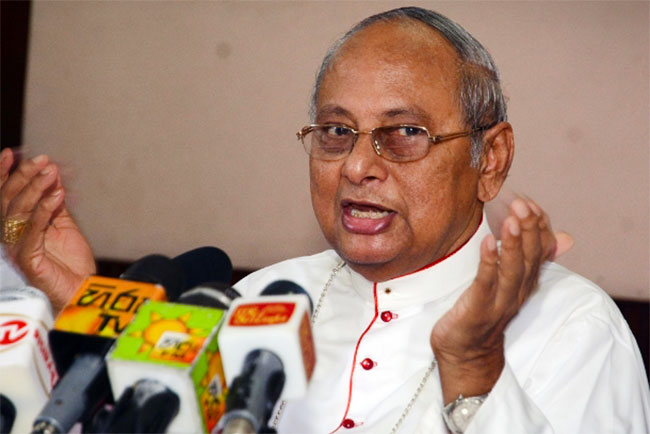
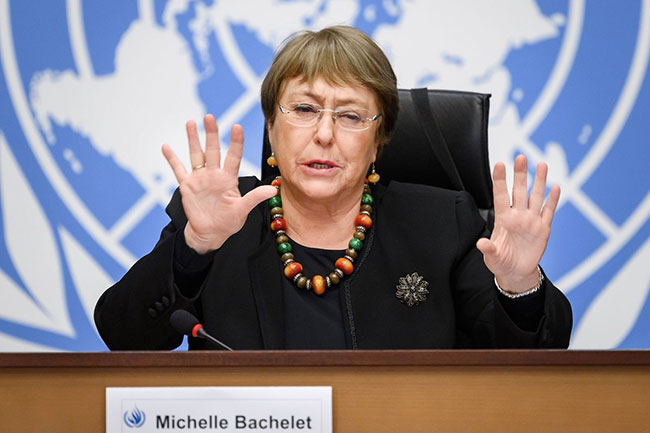
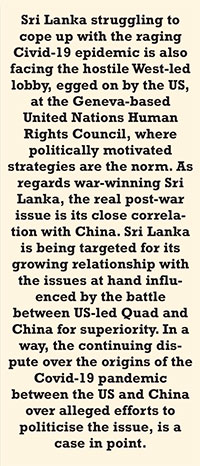 The SLCC comprises (1)Ven. Kalupahana Piyaratana Thera – Inter religious Alliance National Unity, Chairman, Human Development Edification Centre working for peace Reconciliation and Ecology for more than 25 years. Peace activist for more than two decades (2) Bishop Asiri Perera – Retired Bishop/President of Methodist Church (3) Rev. Fr. C.G. Jeyakumar – Parish Priest Ilavalai and Lecturer at the Jaffna Major Seminary, Human Rights Activist (4) Dr. Joe William – Founder member and Chairman of National Peace Council, Director, Centre for Communication Training and Convenor, Alliance for Justice (5) Prof. T. Jayasingam – Director NPC, former Vice Chancellor of Eastern University and former member, Public Service Commission of the Eastern Provincial Council (6) Prof. Kalinga Tudor Silva – Professor Emeritus Dept of Sociology, University of Peradeniya (7) Dr. Dayani Panagoda – Social Activist, former director of Secretariat for Coordinating the Peace Process and Lecturer, former member of the Official Languages Commission (8) Ms. Visaka Dharmadasa – Peace Activist, Chair of Association of War Affected Women (9) Dr. Jehan Perera – Executive Director of NPC (10) Dr. P. Saravanamuttu – Founder and Executive Director, Centre for Policy Alternatives (11) Hilmy Ahamed – Vice President, Muslim Council of Sri Lanka, Civil activist with 35 years of communicating on issues of Peace and Justice, Chairman of Young Asia Television (12) Sanjeewa Wimalagunarathna – Former Director of Secretariat for Coordinating Reconciliation Mechanisms (13) Rohana Hettiarachchi – Executive Director PAFFREL (14) Javid Yusuf – Former Ambassador to Saudi Arabia, former Principal, Zahira College and Founder member and Governing Council member, National Peace Council NPC (15) Varnakulasingham Kamaladas – President, STA Solidarity Foundation, Vice President Batticaloa-Ampara Hindu Temples Federation, former President of Inland Association of Non-Governmental Organisations (INAYAM) Batticaloa, and (16) Ms. Sarah Arumugam – Human Rights Lawyer.
The SLCC comprises (1)Ven. Kalupahana Piyaratana Thera – Inter religious Alliance National Unity, Chairman, Human Development Edification Centre working for peace Reconciliation and Ecology for more than 25 years. Peace activist for more than two decades (2) Bishop Asiri Perera – Retired Bishop/President of Methodist Church (3) Rev. Fr. C.G. Jeyakumar – Parish Priest Ilavalai and Lecturer at the Jaffna Major Seminary, Human Rights Activist (4) Dr. Joe William – Founder member and Chairman of National Peace Council, Director, Centre for Communication Training and Convenor, Alliance for Justice (5) Prof. T. Jayasingam – Director NPC, former Vice Chancellor of Eastern University and former member, Public Service Commission of the Eastern Provincial Council (6) Prof. Kalinga Tudor Silva – Professor Emeritus Dept of Sociology, University of Peradeniya (7) Dr. Dayani Panagoda – Social Activist, former director of Secretariat for Coordinating the Peace Process and Lecturer, former member of the Official Languages Commission (8) Ms. Visaka Dharmadasa – Peace Activist, Chair of Association of War Affected Women (9) Dr. Jehan Perera – Executive Director of NPC (10) Dr. P. Saravanamuttu – Founder and Executive Director, Centre for Policy Alternatives (11) Hilmy Ahamed – Vice President, Muslim Council of Sri Lanka, Civil activist with 35 years of communicating on issues of Peace and Justice, Chairman of Young Asia Television (12) Sanjeewa Wimalagunarathna – Former Director of Secretariat for Coordinating Reconciliation Mechanisms (13) Rohana Hettiarachchi – Executive Director PAFFREL (14) Javid Yusuf – Former Ambassador to Saudi Arabia, former Principal, Zahira College and Founder member and Governing Council member, National Peace Council NPC (15) Varnakulasingham Kamaladas – President, STA Solidarity Foundation, Vice President Batticaloa-Ampara Hindu Temples Federation, former President of Inland Association of Non-Governmental Organisations (INAYAM) Batticaloa, and (16) Ms. Sarah Arumugam – Human Rights Lawyer.